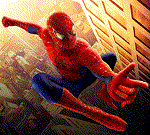
Caught in the web
The first Spider-Man story was originally intended as no more than a one-shot experiment, and almost didn't get into print at all. "Martin Goodman didn't want to publish it," recalls Stan Lee. Goodman was convinced that readers would find the subject of spiders distasteful.
Fortunately for all concerned, a comic book called Amazing Fantasy was about to be canceled due to faltering sales. "Nobody cares what you put in a book that's going to die," Lee says, "so I threw in Spider-Man. I featured him on the cover and then forgot about him." For the occasion the comic book reverted to its original title of Amazing Fantasy, an appropriate amendment since Spider-Man was to be the most important adolescent super hero in comics.
Spider-Man was the hero and teenage helper rolled into one; he was his own sidekick. Marvel's first editor, Joe Simon, theorized that kid companions like Captain America's Bucky were important because they gave the protagonist someone to talk to; Spider-man talked to himself. In fact he has delivered more siloquies than Hamlet. In his first appearance he mused out loud but subsequently Lee adopted the device of the thought balloon with its characteristic bubbles. "I used those thought balloons to help the exposition," says Lee. "I could put interesting thoughts there that weren't necessarily about what ws happening in that particular panel - something to hold the reader's interest."
Spider-Man, despite the fact that he was not originally intended to star ina series, became the epitome of the radical innovations that characterized The Marvel Age. Lee used him to challenge the very concept of the super hero. Spider-Man was neurotic, compulsive and profoundly skeptical about the whole idea of becoming a costumed savior. The Fantastic Four argued with each other, and The Hulk and Thor had problems with their alter egos, but Spider-Man had to struggle with himself.
In the original story (August 1962), Peter Parker is a bookish, bespectacled high school student, isolated and unpopular. An orphan, he lives with his elderly relatives, Aunt May and Uncle Ben. While attending a science exhibit, Peter is bitten by a spider that has accidentally received a dose of radioactivity. As a result, Peter acquires the agility and proportionate strength of an arachnid. He sews his own super hero uniform and uses his scientific knowledge to build mechanical devices that eject sticky webbing, but he is less interested in fighting crime than in making a buck. Disguised as Spider-Man, he becomes a professional wrestler and then demonstrates his abilities on television. Hw blithely ignores the chance to stop a fleeing thief, but his indifference ironically catches up with him when the same criminal later robs and kills Uncle Ben. Eventually Spider-Man subdues the murderer, but for a tearful Peter Parker, there is no peace. He wanders remorsefully off into the night to the accompan iment of Lee's now famous caption: "With great Power there must also come - great responsibility!"

No comments:
Post a Comment